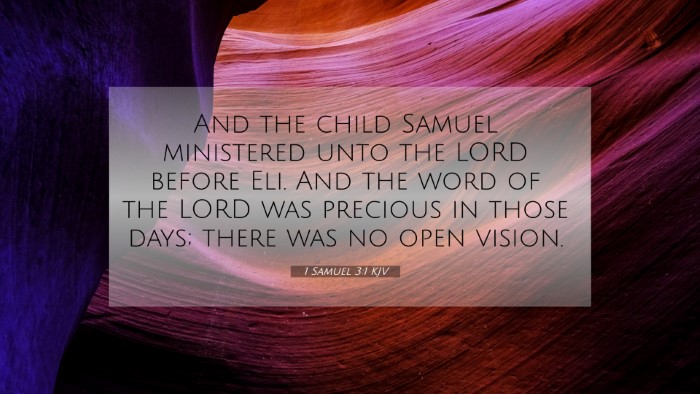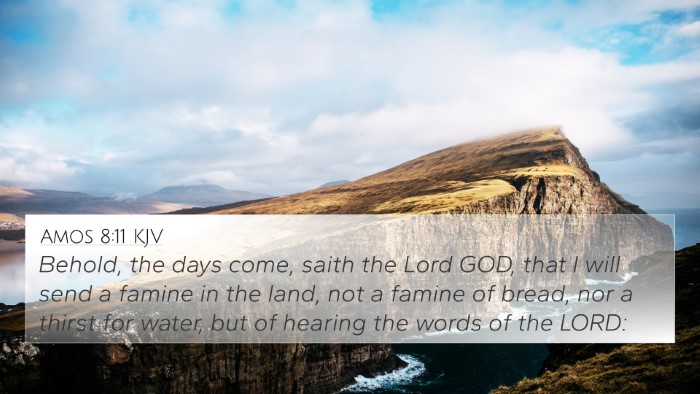Bible Verse: 1 Samuel 3:1
This verse illustrates a significant moment in the biblical narrative, wherein the prophecy and the calling of Samuel take place against a backdrop of divine silence and moral decline.
Summary of the Meaning of 1 Samuel 3:1
The verse reads:
"And the child Samuel ministered unto the Lord before Eli. And the word of the Lord was precious in those days; there was no open vision."
- Contextual Background:
During this period, the Israelites were experiencing a spiritual famine, signified by a lack of prophetic revelation. The priest Eli, despite his priestly role, had failed to correct the corruption within his house, leading to God's silence.
- Significance of Samuel’s Role:
Samuel, a young child dedicated to the service of the Lord, represented hope and renewal for Israel. His service under Eli indicated a preparation for greater responsibilities to come.
- The Word of the Lord:
The phrase "the word of the Lord was precious" suggests that God’s communication was rare and highly valued, indicating the dire need for a fresh revelation. In a time when the people were greedy for direction, Samuel was being groomed as a prophet.
- Cultural Reflection:
The lack of “open vision” reflects not only on the absence of prophetic messages but also signifies the spiritual blindness of the people. This sets the stage for God's re-entrance into their lives through Samuel.
Commentary Insights
Insights from Matthew Henry:
Matthew Henry emphasizes the importance of Samuel's youthful service, noting that God often chooses the humble and young to fulfill His purposes. He also stresses that a period of divine silence serves as a precursor to a new beginning—a change that will come with Samuel as the intermediary.
Insights from Albert Barnes:
Albert Barnes corroborates the essence of the verse by identifying the state of Israel as spiritually desolate. He highlights the necessity of Samuel’s role as transformative for the Israelites, noting that the absence of prophetic guidance underscores a period of crisis.
Insights from Adam Clarke:
Adam Clarke focuses on the need for divine revelation in a time of decay. He places an importance on the notion that, despite the silence, God was preparing to speak again through Samuel. Clarke's commentary also points towards the coming consequences of Eli’s neglect of his priestly duties, aligning it with the greater narrative of redemption found throughout the Bible.
Cross References
This verse can be cross-referenced with:
- Jeremiah 29:13: "And ye shall seek me, and find me, when ye shall search for me with all your heart."
- Amos 8:11: "Behold, the days come, saith the Lord God, that I will send a famine in the land, not a famine of bread, nor a thirst for water, but of hearing the words of the Lord."
- 1 Samuel 2:35: “And I will raise me up a faithful priest, that shall do according to that which is in mine heart and in my mind...”
- Luke 10:16: "He that heareth you heareth me; and he that despiseth you despiseth me; and he that despiseth me despiseth him that sent me."
- Hebrews 1:1: "God, who at sundry times and in divers manners spake in time past unto the fathers by the prophets..."
- Matthew 5:6: "Blessed are they which do hunger and thirst after righteousness: for they shall be filled."
- 1 Kings 3:9: "Give therefore thy servant an understanding heart to judge thy people, that I may discern between good and bad..."
Connections with Other Verses
This verse invites deeper study and presents opportunities for comparative Bible verse analysis. The connections with other scriptures provide insights into the themes of divine calling, revelation, and the consequences of spiritual neglect.
Identifying Connections:
- The thematic threads of prophetic calling and listening to God resonate throughout the Scriptures.
- Connections between the Old and New Testament highlight God's unchanging nature in guiding His people through chosen individuals.
- Consider Isaiah 6:8, where God calls Isaiah, which parallels with Samuel's calling in his youth.
- The New Testament echoes themes found in 1 Samuel, particularly in the calling of the first disciples as they are directed by God's voice.
- Exploration of prophets throughout the Old Testament leads to a greater understanding of God's communication across different eras, establishing an inter-biblical dialogue.
Conclusion
The verse 1 Samuel 3:1 serves not only as a biographical sketch of Samuel's beginnings as a prophet but also as a profound reminder of the vital importance of discernment in hearing God's voice amidst spiritual decline. The Biblical exegesis here highlights how God's invitation remains open for those who seek to serve Him faithfully.









